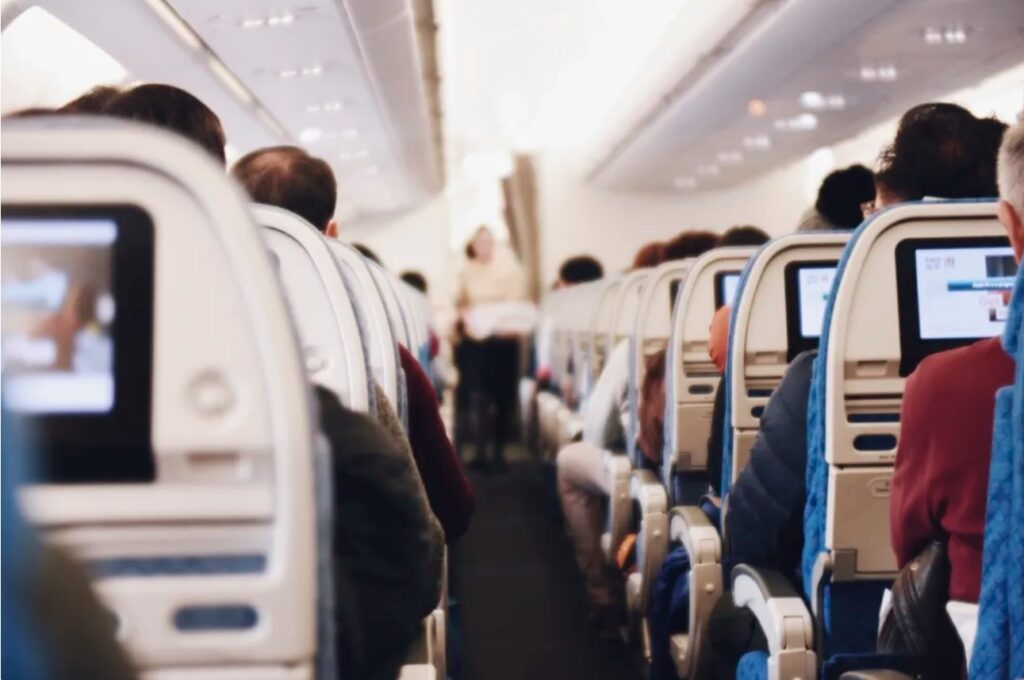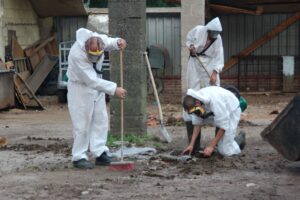The body of evidence linking the occupation of cabin crew to an increased risk of breast cancer is steadily growing. Now that there is a chance of it gaining recognition as an occupational disease, more and more trade unions and associations are engaging with the issue.
Like many illnesses, cancer strikes without warning. ‘I was about to go off on holiday,’ recalls Sandrine Flouré, a flight attendant for a leading French airline. ‘I had a mammogram as part of my course of in vitro fertilisation, and breast cancer was found. It was life-changing.’ The next few months were a whirlwind of MRI (magnetic resonance imaging) scans, biopsies, oncologist appointments and radiotherapy. ‘The treatment’s a killer… and I didn’t even have chemotherapy,’ says Sandrine, a lady in her forties who has already worked for half a dozen French airlines. ‘I found out on the internet that flight attendants are especially prone to develop breast cancer. I had no idea that my job was highly likely to put my life in danger.’
Multiple risk factors
Is the job of a flight attendant hazardous? A number of scientific studies published in recent years would seem to suggest that it is. A study by the Harvard Medical School’s Faculty of Medicine,[1] in particular, caused a stir in 2018. This covered several thousand American flight attendants of both sexes between 2007 and 2015, and revealed that cabin crew were predisposed to certain cancers (skin, uterus, stomach, breast, etc.). Cancers of the uterus or skin are four times more frequent than in the general population, and the risk of breast cancer is 51% higher. This last figure is especially worrying to flight attendants: breast cancers are the leading cause of female cancer deaths[2] and, according to a 2016 study[3] published in the prestigious scientific journal Nature, are almost 90% due to causes other than genetic factors.
In the case of cabin crew, most of the risk factors flagged up by the Harvard study are already familiar to the scientific community. Night work or exposure to ionising radiation (cosmic rays emitted by the sun that are stronger at higher altitudes), are identified as ‘probable‘ and ‘known’ risks for breast cancer by the International Agency for Research on Cancer (IARC). Other factors, such as irregular working hours, crossing time zones, or cabin air quality, may also play a role. ‘We combine a number of major risk factors, both long- and medium-haul,’ confirms Arzelle Saighi, age 47, an Air France flight attendant diagnosed with breast cancer in 2015. ‘Short- and medium-haul flights don’t involve a significant time change, it’s true, but they are still stressful,’ says her colleague Émilie Le Gars, whose cancer necessitated a mastectomy. ‘We get up very early and sometimes do up to four take-offs a day, standing on our feet almost all the time and sometimes next to aircraft doors that are open in the depths of winter.’
The disease has severe consequences for all that. ‘My cancer meant that I couldn’t work for three years, making my financial situation precarious. My earnings more than halved,’ says Le Gars, who is a single mother to her son. Losing flight bonuses, an essential part of cabin crew earnings, is particularly painful. ‘You lose a lot of the elements of your salary; the illness is far from neutral in its financial effects,’ agrees Sandrine Flouré. ‘And that’s why I wanted to get my breast cancer recognised as an occupational illness.’ Once the toughest part of her treatment was over, she consulted the Fédération Nationale des Accidentés du Travail et des Handicapés (FNATH), a not-for-profit organisation supporting accident victims and persons with disabilities, and decided to put together a case to have her cancer recognised as an occupational illness by her health insurer. Sadly, her application was ultimately rejected. ‘The problem is that there are no causal links in the social security nomenclature between night work, ionising radiation and breast cancer,’ the flight attendant explains.
Breast cancers in men
Breast cancer is an almost exclusively female cancer, but there are also a large number of male airline cabin crew whose working conditions expose them to the risk of cancer. At Air France, the association called Les Hommes de l’Air (Men of the Air) was formed in 2018 to provide a forum for discussion of this often forgotten issue. ‘A number of men with cancer came to see me, astonished by the fact that male cancers are ignored both in the public sphere and at work,’ explains Stéphane Noël, co-founder of the association. When male cancers affect reproductive capacity, they often become even more taboo than breast cancer in women, making it difficult to quantify the phenomenon. ‘It’s more that men keep quiet about it rather than society ignoring it, and that’s why we need medical research on breast cancer in men as well as women,’ argues Noël.
The battle for recognition
Getting a cancer recognised as work-related, especially if it is not listed in the occupational illness tables of the social security system (French: Sécu), is often something of an obstacle course. ‘If your illness is not in the Sécu tables, you have to prove permanent partial disability of at least 25% and direct causality between employment and illness,’ says Jean-Luc Rué, who sits for the French Democratic Confederation of Labour (CFDT) on the occupational diseases committee of the Guidance Council for Working Conditions (COCT), the consultative body in which representatives of workers and employers discuss, among other issues, whether changes are needed to the occupational illness tables. ‘In reality, it’s very hard to get an unlisted illness recognised, in either the state or private system,’ laments Lucien Privet, a Nancy doctor who has helped thousands of workers with their applications over the past 40 years. ‘Breast cancer is on the committee’s agenda, but it is hard to say exactly when talks with the employers will be completed, because we have other issues to consider too, and Covid-19 has slowed down our work a lot,’ explains Jean-Luc Rué, who is also coordinator of the CFDT’s breast cancer group. ‘Civil society is going to have to mobilise, because the more cases come to light, the more they’ll be talked about and the more action there will be by institutions as well.’
Action is precisely what Sylvie Pioli resolved to take. Diagnosed with breast cancer in 2014, this former night nurse based in the Bouches-du-Rhône founded an association called Cyclosein and she now cycles round metropolitan France alerting civil society and government authorities. ‘I don’t drink, I don’t smoke, and there’s nothing in my genes. No risk factors. So when I learned that night work is known to cause cancer and I’d never been told this, I was appalled. I told myself I couldn’t let that pass,’ she explains. She aims to be one of the first to get breast cancer recognised as an occupational illness, with backing from the CFDT Lorraine union, whose carers’ and nurses’ section has built up a measure of experience in this area. The prevalence of breast cancer in flight attendants may still be relatively unknown, but hospital staff, whose working conditions are in several respects similar to those of cabin crew, have been mobilised for a number of years now.
Mobilisation of the trade union sections
‘Because of its history as a coal mining area, Lorraine has years of experience in recognising occupational illnesses,’ says François Dosso, a former CFDT miner who was part of the battle to get recognition of the occupational illnesses caused by asbestos. ‘Towards the end of the 2000s, several carers and nurses in the region reported that an increasing number of them were developing breast cancer and asked if there was a link between their occupation and cancer.’ The miners then pointed medical staff in Lorraine’s hospitals towards night work and ionising radiation, which had been suspected of probably causing cancer for several years. Then, in 2012, two studies assembled a body of evidence incriminating night work. The CFDT Grand-Est union called for general mobilisation. ‘We contacted the network at confederation level and recruited volunteers to put together a national team. We trained at the Labour Institute (IDT) in Strasbourg with breast cancer specialists, and then we compiled questionnaires for distribution as part of a survey,’ explains François Dosso. The aim of the survey was simple: to identify cases of breast cancer that were thought to be work-related and apply for them to be recognised by the health insurance funds. ‘It’s good to raise people’s awareness, but you have to submit applications for recognition if you really want things to move forward and be taken seriously by the Sécu. That’s what a survey has to try to do,’ says Lucien Privet, who helped identify occupational factors in the many cases involving nurses.
Pink flights
As more flight attendants seek to get their breast cancers recognised as an occupational illness, aviation circles are focusing on prevention. ‘In tackling the problem of work-related cancers, we must bear in mind one fact: these cancers are entirely preventable,’ write Tony Musu and Laurent Vogel, who coordinated the production of a reference text on work-related cancers for the European Trade Union Institute (ETUI). ‘What really matters, initially, is detection,’ says Ornella Gaudin, who coordinates UNPNC-CFDT work on breast cancer. ‘That’s why our union is investing in pink October, the national awareness-raising campaign on this issue.’
A number of other cabin crew associations have enjoyed a high profile in recent years, chief among them being Les Hotesses de l’Air contre le Cancer (Flight Attendants against Cancer), headed by Jean-Claude Chau, a steward with Air France.
We began by selling calendars, and then we created ‘pink flights’ – raising funds by selling accessories to passengers. Air France doesn’t finance us, but is happy to work with us and let us conduct our campaign, he says.
Some flight attendants are demanding more than self-examination and want occupational medicine to play a greater role. ‘They should inform us better about the risks, so we can start having mammograms earlier than the usual age of 50,’ says one flight attendant with cancer. Air France may be happy for associations to mobilise against breast cancer, but others think that the national carrier does nowhere near enough. ‘Supporting associations butters no parsnips. Air France must be more accepting of its responsibilities,’ comments one trade union source very familiar with the airline. ‘The company should, for example, organise large-scale training in cancer detection.’ All the more of a challenge in that the airlines are not required to contribute because the health insurance funds do not recognise breast cancer as an occupational illness. ‘For the moment, it’s national solidarity that foots the bill. Recognition would enable the cost to be passed back to the airlines,’ says Jean-Luc Rué.
The example of Denmark
At European level, recognition of breast cancer as work-related is still at an early stage. No country has yet taken measures specifically for the aviation sector, but in 2009 Denmark adopted a law recognising the link between night work and breast cancer. Thus a woman who has done night work for 20 years and has no other risk factors can receive specific compensation. Nurses and flight attendants are the cohorts on which the science has focused most, but many other sectors are exposed to the same risk factors and might be addressed in future legislation. Other issues, such as air quality, remain research blind spots. ‘More work should be done on pollution by chemicals and aviation fuel vapours to limit exposure in aircraft or at airports,’ warns Susan Michaelis, a former airline pilot diagnosed with breast cancer two decades after being exposed to fuel vapours and now a researcher at the University of Stirling. In general, work-related cancer is seen by many specialists as an issue that is all too often forgotten, with recognised and compensated cases accounting for only 10% or so of occupational conditions. ‘Visibility of the link between work and cancer remains very poor. Benefit schemes for occupational illnesses pay out for only a very small number of cancers and their statistics lead to an underestimated and warped picture of the real situation,’ according to Tony Musu and Laurent Vogel. In the air as elsewhere, the battle for recognition is only just beginning.
References
[1] McNeely et al. (2018) Cancer prevalence among flight attendants compared to the general population, Environmental Health.
[2] World Health Organization (2021) Breast cancer. https://www.who.int/news-room/fact-sheets/detail/breast-cancer
[3] Wu S., Powers S., Zhu W. and Hannun Y. (2016) Substantial contribution of extrinsic risk factors to cancer development.
For further reading
- Fouquet C. (2018) Cancer: Les personnels navigants présentent un risque accru, Les Echos.
- Cancer environnement (2019) Cancérogénicité du travail de nuit posté.
- Cancer environnement (2019) Radioactivité (rayonnements ionisants) et cancer.
- EURECCA (2015) Contaminated cabin air on passenger aircrafts.
- Musu T. and Vogel L. (eds.) (2018) Cancer and work: understanding occupational cancers and taking action to eliminate them, ETUI.
- Rafnsson V. et al. (2001) Risk of breast cancer in female flight attendants: a population-based study (Iceland), Cancer Causes & Control, 12 (2), 95-101.
- Ruffinengo E. (2012) Le travail de nuit, un risque pour le cancer du sein, WECF-France.
- The Lancet (2009) Breast cancer on the night shift, 373 (9669).
Originally published (full version) in HesaMag #25 (European Trade Union Institute, ETUI)



